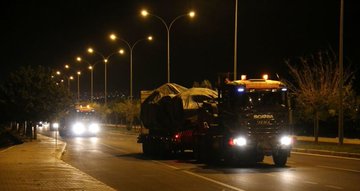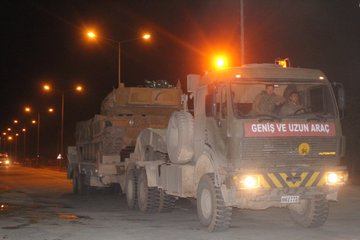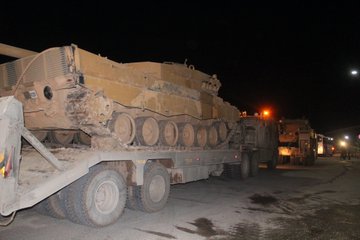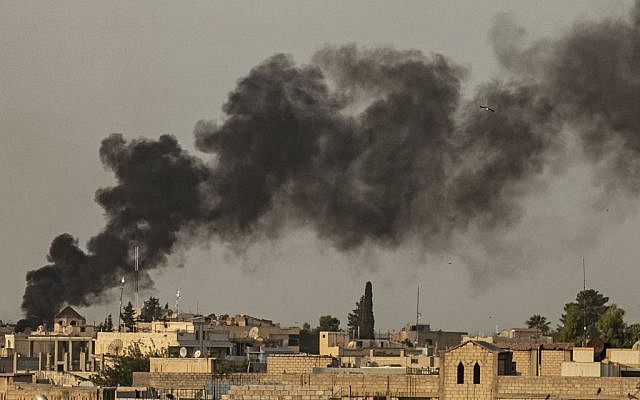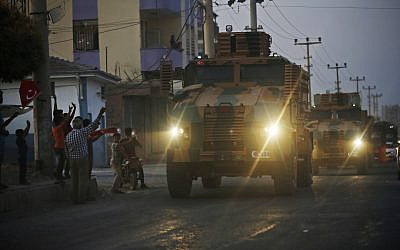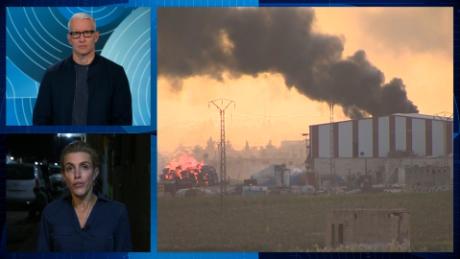https://www.timesofisrael.com/as-turkey-launches-ground-invasion-shaked-calls-for-kurdish-state/
As Turkey launches ground invasion, Shaked calls for Kurdish state
Former justice minister reiterates support for an independent Kurdistan; Blue and White’s Hauser says murder of Kurds will lead to wave of refugees, increase regional instability
By
Raphael Ahren 9 October 2019, 11:53 pm
2
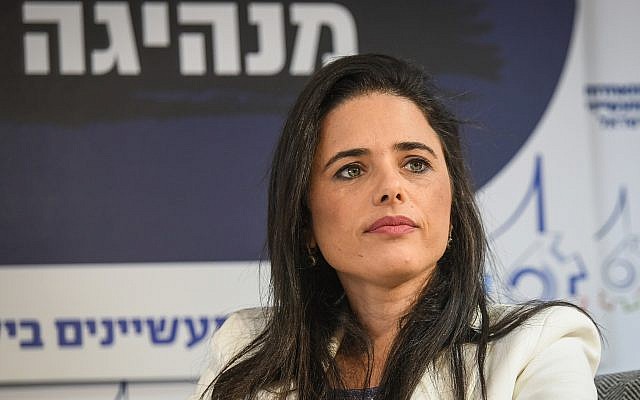
Yamina party chairwoman Ayelet Shaked speaks at a Manufacturers Association conference in Tel Aviv, on September 2, 2019. (Flash90)
Yamina party chairwoman Ayelet Shaked on Wednesday reissued a call for Kurdish statehood, urging the West to support the Kurds as
Turkey launched a military campaign in northern Syria.
“Our national memory requires us to revolt against violence directed against another nation. Such is the Turkish violence directed against the Kurdish people in northern Syria,” the former justice minister wrote on Facebook.
“I have said this in the past: It is in the interest of both Israel and the United States, for the security and stability of the region, that a Kurdish state be established,” she wrote.
Get The Times of Israel's Daily Edition by email and never miss our top stories Free Sign Up
“The Kurds are the world’s largest nation without a country, with a population of about 35 million people. They are an ancient people that share a special historical connection to the Jewish people,” she went on.

A Syrian Kurdish woman flashes the v-sign during a demonstration against Turkish threats in Ras al-Ain town in Syria’s Hasakeh province near the Turkish border on October 9, 2019. Turkish warplanes were reported to be attacking the town hours later. (Photo by Delil SOULEIMAN / AFP)
Kurds, especially those living in Turkey and northern Syria, “are the most progressive and Western in that region,” Shaked wrote.
“They are the main force that fought against ISIS and endured thousands of deaths, under a special joint leadership of men and women. The Western world should stand with them.”
Smoke billows following Turkish bombardment on Syria’s northeastern town of Ras al-Ain in the Hasakeh province along the Turkish border on October 9, 2019 (Delil SOULEIMAN / AFP)
In 2016, Shaked, then justice minister, first
openly endorsed the idea of an independent Kurdistan.
“We must openly call for the establishment of a Kurdish state that separates Iran from Turkey, one which will be friendly towards Israel,” she said at a security conference in Tel Aviv.
“The Kurdish people are a partner for the Israeli people,” she said noting the shared interests of Israel and the Kurds in defeating the rise of jihadist Islamist groups in the region.
Shortly after the Turkish operation inside Syria had started, local residents cheer and applaud as a convoy of Turkish forces vehicles is driven through the town of Akcakale, Sanliurfa province, southeastern Turkey, at the border between Turkey and Syria, Oct. 9, 2019 (AP Photo/Lefteris Pitarakis)
“The Kurds are an ancient, democratic, peace-loving people that have never attacked any country,” she said, adding that economic cooperation should be on the forefront of any official ties.
“It is time to help them,” Shaked added.
On Wednesday, Turkey launched a broad assault on Kurdish-controlled areas in northeastern Syria on Wednesday, with intensive bombardment paving the way for a ground offensive made possible by the withdrawal of US troops.
Turkish President Recep Tayyip Erdogan announced the start of the attack on Twitter and soon after jets and artillery targeted Kurdish positions along the full width of the border, sending thousands of civilians fleeing their homes.
Shaked was not the only politician who commented on the Kurdish question on Wednesday.
“As a nation-state of an ethnic minority in the Middle East, Israel cannot close its eyes to the suffering of the Kurds in the region,” tweeted Blue and White MK Zvi Hauser.
Zvi Hauser of Blue and White party in the Israeli parliament on May 6, 2019 (Noam Revkin Fenton/Flash90)
“Murder and deportation of the Kurds will lead to a wave of refugees, change the demographic reality and increase instability, even from Israel’s point of view. Israel must internalize the new rules of the game in the region with regard to all challenges,” Hauser wrote.
The Prime Minister’s Office has so far refused to comment on US President Donald Trump’s decision to withdraw all American troops from Syria and effectively green-lighting a Turkish offensive in the area, which many observers fear could turn into a bloodbath for America’s erstwhile Kurdish allies.
In 2014, Prime Minister Benjamin Netanyahu had expressed support for an independent Kurdistan. He praised their “political commitment and political moderation,” and said the Kurdish people were “worthy of their own political independence.”
But Yair Netanyahu, the prime minister’s son, positioned himself as a supporter of Kurdish independence on Wednesday, tweeting a Kurdish flag together with the hashtag #freekurdistan.
Tamar Pillegi and AFP contributed to this report.
https://edition.cnn.com/videos/us/2...sode-clarissa-ward-syria-turkey-kurds-vpx.cnn
https://www.sammyboy.com/javascript:void(0);
CNN reporter vividly details scene of Turkish strikes against Kurds
Anderson Cooper speaks with CNN's Clarissa Ward, the only US network reporter in northern Syria, as Turkey continues its attacks against US-allied Kurds . Watch "Full Circle" every weeknight at 5pm E.T.
Source: CNN
https://www.pressofatlanticcity.com...cle_ba13d3f9-f547-5363-a6e8-7e790b0a8e04.html
Turkey launches attack against US-allied Kurds in Northern Syria
- By LEFTERIS PITARAKIS and BASSEM MROUE, Associated Press
- Oct 9, 2019 Updated 45 min ago
AKCAKALE, Turkey (AP) — Turkey launched airstrikes and fired artillery aimed at crushing Kurdish fighters in northern Syria on Wednesday after U.S. troops pulled back from the area, paving the way for an assault on forces that have long been allied with the United States.
Turkish President Recep Tayyip Erdogan announced the start of the campaign, which followed an abrupt decision Sunday by U.S. President Donald Trump that American troops would step aside to allow for the operation.
Your Morning Kickstart is delivered to your inbox 7 a.m. daily. Make sure you don’t miss out on the latest in news, entertainment, weather, and sports.
SUBSCRIBE HERE
Trump's move, which has drawn harsh bipartisan opposition at home, represented a shift in U.S. policy that essentially abandoned the Syrian Kurdish fighters who have been America's only allies inside Syria in the fight against the Islamic State group.
After Turkey's offensive began, there was sign of panic in the streets of Ras al-Ayn— one of the towns under attack with residential areas close to the borders. Cars raced to safety, although it was not clear if they were leaving the town or heading away from border areas. Near the town of Qamishli, plumes of smoke were seen rising from an area close to the border after activists reported sounds of explosion nearby.
At least one member of the Kurdish-led force known as the Syrian Democratic Forces was killed in the Turkish bombardment, Kurdish activists and a Syria war monitor said.
Turkey's campaign — in which a NATO member is raining down bombs on an area where hundreds of U.S. troops are stationed — drew immediate criticism and calls for restraint from Europe.
"Coalition forces are not near the places Turkey has struck so far," an official with the U.S.-led coalition told The Associated Press.
The Kurdish forces have warned of a "humanitarian catastrophe" that could potentially unfold because of the Turkish military operation.
"Our mission is to prevent the creation of a terror corridor across our southern border, and to bring peace to the area," Erdogan said in a tweet.
He added that Turkish Armed Forces, together with Turkish-backed Syrian fighters known as the Syrian National Army, had begun what they called "Operation Peace Spring" against Kurdish fighters to eradicate what Erdogan said was "the threat of terror" against Turkey.
Minutes before Erdogan's announcement, Turkish jets began pounding suspected positions of Syrian Kurdish forces in the town of Ras al Ayn, according to Turkish media and Syrian activists. The sound of explosions could be heard in Turkey.
A photograph released to Turkish media showed Erdogan at his desk, reportedly giving orders for the start of the operation.
A Turkish army officer prepares to upload a tank from a truck to its new position on the Turkish side of the border between Turkey and Syria, in Sanliurfa province, southeastern Turkey, Tuesday, Oct. 8, 2019. Tensions have risen at the border between Turkey and Syria, on expectation of a Turkish military incursion into Syria. (AP Photo/Lefteris Pitarakis)
Lefteris Pitarakis
It was difficult to know what was hit in the first hours of the operation.
Mustafa Bali, a spokesman for the U.S.-backed Syrian Democratic Forces, said Turkish warplanes were targeting "civilian areas" in northern Syria, causing "a huge panic" in the region.
Before Turkey's attack, Syrian Kurdish forces that are allied with the United States issued a general mobilization call, warning of a "humanitarian catastrophe.".
The Turkish operation meant to create a so-called "safe zone" carries potential
gains and risk for Turkey by getting even more deeply involved in the Syria war. It also would ignite new fighting in Syria's 8-year-old war, potentially displacing hundreds of thousands.
Turkey has long threatened to attack the Kurdish fighters whom Ankara considers terrorists allied with a Kurdish insurgency in Turkey. AP journalists on the Turkish side of the border overlooking Tal Abyad saw Turkish forces crossing into Syria in military vehicles.
Expectations of an invasion increased after Trump's announcement, although he also threatened to "totally destroy and obliterate" Turkey's economy if the Turkish push into Syria went too far.
In the U.S., Republican critics and others said he was sacrificing an ally, the Syrian Kurdish forces, and undermining Washington's credibility. Trump tweeted that he is focused on the "BIG PICTURE" that does not include American involvement in "stupid endless wars" in the Middle East.
Turkey "has legitimate security concerns" after suffering "horrendous terrorist attacks" and hosting thousands of refugees, said NATO Secretary-General Jens Stoltenberg.
But he also said in Rome that Turkey should not "further destabilize the region" with its military action in Syria.
German Foreign Minister Heiko Maas condemned the offensive, saying it will "further destabilize the region and strengthen IS." The operation also was criticized by European Commission President Jean-Claude Juncker.
The EU is paying Turkey 6 billion euros ($6.6 billion) to help the country cope with almost 4 million Syrian refugees on its territory in exchange for stopping migrants leaving for Europe. But Ankara seeks more money amid concerns that thousands of Syrians could soon cross its border.
Fahrettin Altun, the Turkish presidency's communications director, called on the international community to rally behind Ankara, which he said would also take over the fight against the Islamic State group.
Turkey aimed to "neutralize" Syrian Kurdish militants in northeastern Syria and to "liberate the local population from the yoke of the armed thugs," Altun wrote in a Washington Post column published Wednesday.
Erdogan discussed plans for the incursion by phone with Russian President Vladimir Putin. Erdogan's office said he told Putin the military action in the region east of the Euphrates River "will contribute to the peace and stability" and also "pave the way for a political process" in Syria.
In its call for a general mobilization, the local civilian Kurdish authority known as the Autonomous Administration of North and East Syria asked the global community to live up to its responsibilities as "a humanitarian catastrophe might befall our people."
The Kurds also said they want the U.S.-led coalition to set up a no-fly zone in northeastern Syria to protect the civilian population from Turkish airstrikes.
The U.S.-backed Syrian Kurdish group urged Moscow to broker and guarantee talks with the Syrian government in Damascus in light of the military operation. The Syrian Kurdish-led administration said it is responding positively to calls from Moscow encouraging the Kurds and the Syrian government to settle their difference through talks.
Syria's Foreign Ministry condemned Turkey's plans, calling it a "blatant violation" of international law and vowing to repel an incursion. He said some Kurdish groups were being used as a tool to help an alleged "American project," but added Syria is ready to welcome back its "stray sons if they return to their senses," referring to the pro-U.S. Kurdish fighters.
 News
The controversy over Trump's plan to pull US troops out of Syria, explained
News
The controversy over Trump's plan to pull US troops out of Syria, explained
- By Frederik Pleitgen, CNN
Russian Foreign Minister Sergey Lavrov accused Washington of playing "very dangerous games" with the Syrian Kurds, saying that the U.S. first propped up the Syrian Kurdish "quasi state" in Syria and now is withdrawing its support.
"Such reckless attitude to this highly sensitive subject can set fire to the entire region, and we have to avoid it at any cost," he said in Kazakhstan. Russian news media said Moscow communicated that position to Washington.
Earlier Wednesday, IS militants targeted a post of the Kurdish-led Syrian Democratic Forces in the northern Syrian city of Raqqa, which was once the de facto IS capital at the height of the militants' power in the region.
The SDF, which holds thousands of IS fighters in detention facilities in northeastern Syria, has warned that a Turkish incursion might lead to the resurgence of the extremists. The U.S.-allied Kurdish-led force captured the last IS area controlled by the militants in eastern Syria in March.
In the IS attack, three suicide bombers struck Kurdish positions in Raqqa. There was no immediate word on casualties. An activist collective known as Raqqa is being Silently Slaughtered reported an exchange of fire and an explosion.
The Observatory said the attack involved two IS fighters who engaged in a shootout before blowing themselves up.
IS claimed responsibility, saying one of its members killed or wounded 13 SDF members.
___
El Deeb reported from Beirut. Associated Press writers Suzan Fraser in Ankara, Turkey; Mehmet Guzel in Akcakale, Turkey; Nasser Karimi in Tehran, Iran; Nataliya Vasilyeva in Moscow and Bassem Mroue in Beirut contributed.
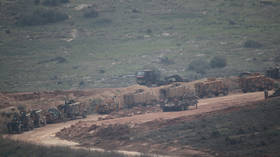



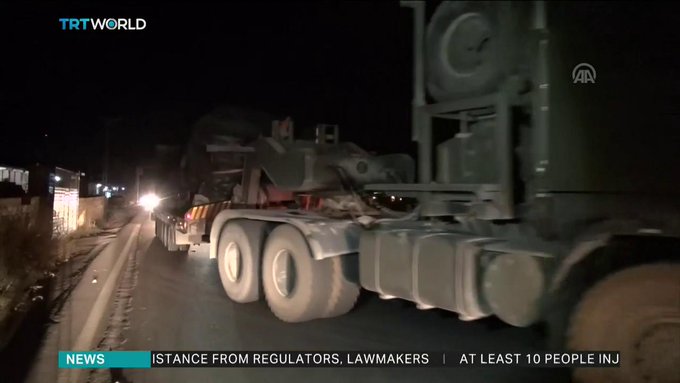

Türk Silahlı Kuvvetleri | Turkish Armed Forces@TurkishAF_



